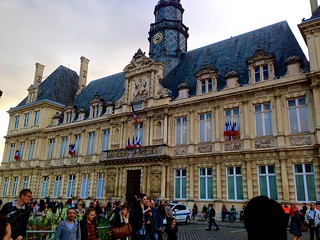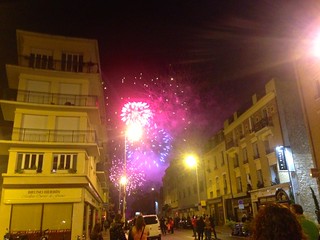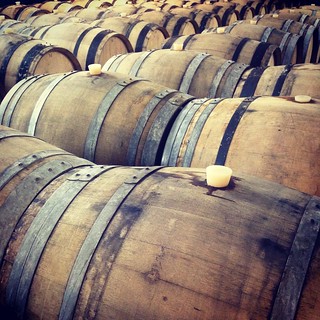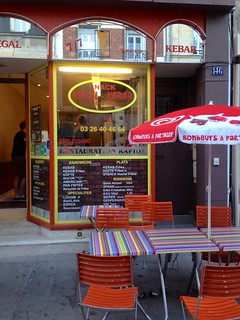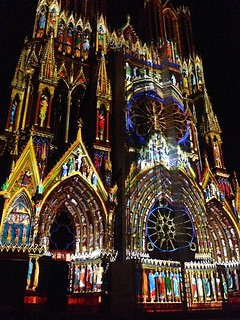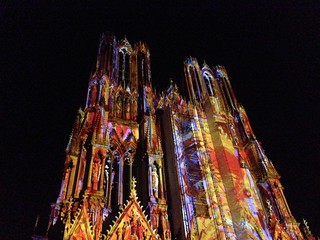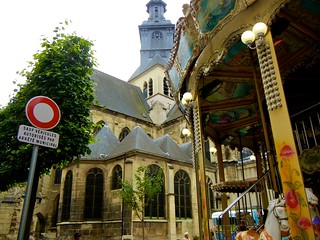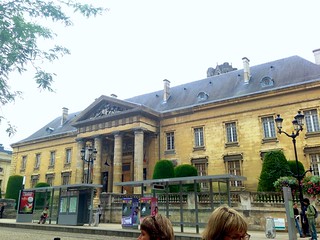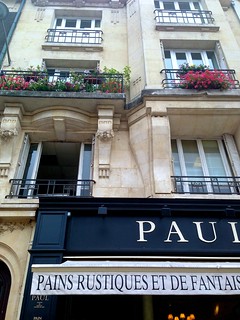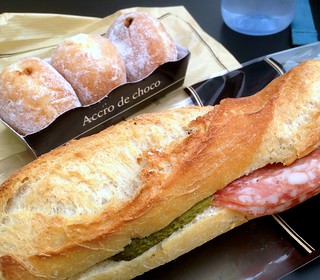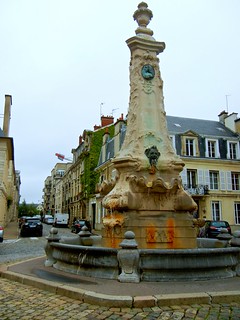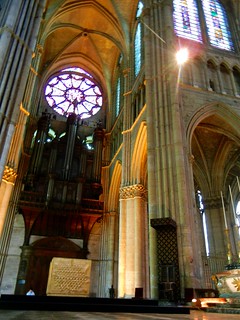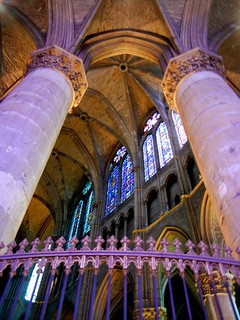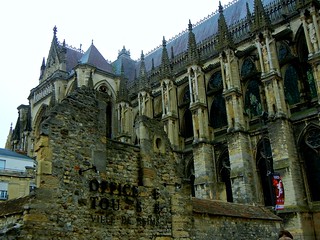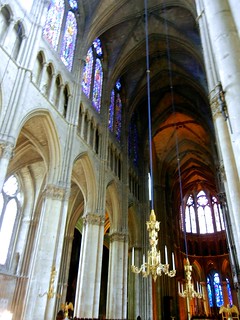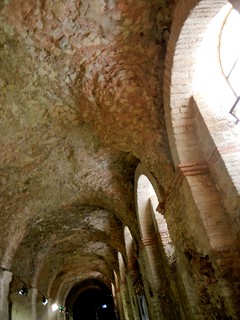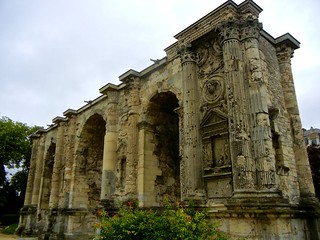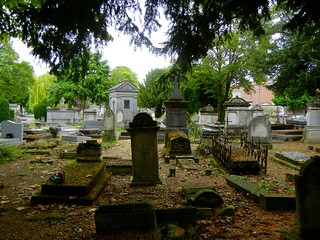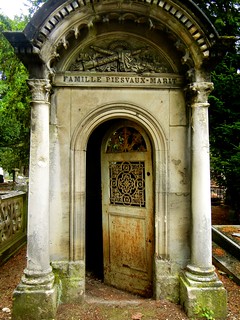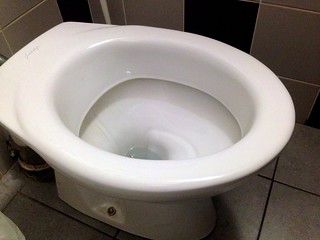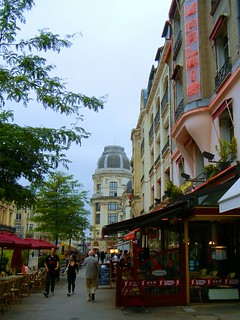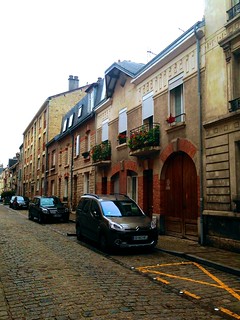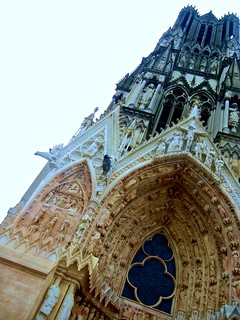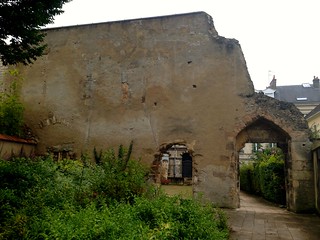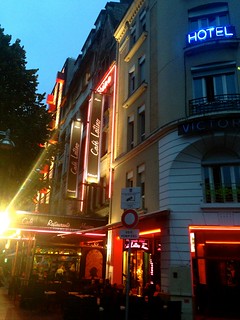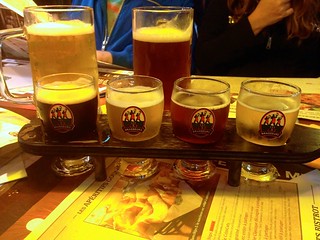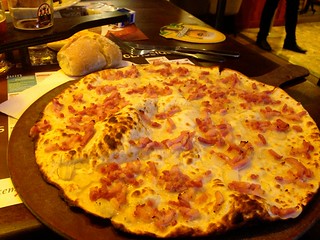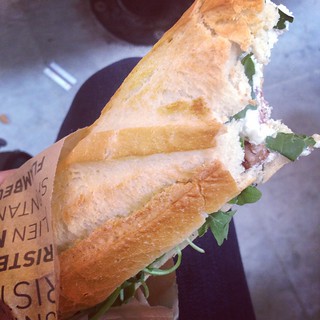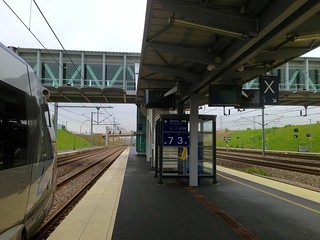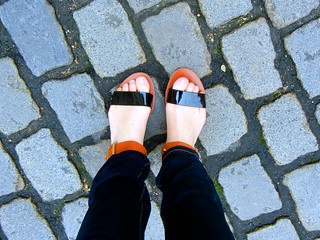Note: This post will be the only post about the academic portion of my travels -- namely, four days of summer school and four days of the IACCP congress. There are explorations and photos mixed in, but no unfortunate misunderstandings or awkward bathroom experiences. I type this while on the train to Paris, so rest assured the explorations will continue! I ended my last post with a brief mention of the main reason why I'm gallivanting across Europe for a month: I was accepted to co-chair and give an oral symposium at the International Association for Cross-Cultural Psychology congress, which has been going on for more than 40 years, and was later accepted to attend IACCP's pre-conference "Ph.D. Summer School" for grad students and recent Ph.D. graduates.
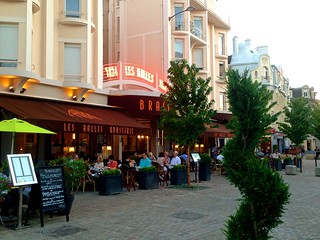 After my crash-landing nap at the hostel, I made a vague attempt to look like I hadn't just crawled out of bed and headed downstairs to meet my fellow summer schoolers over local rosé and champagne. I was one of three students from the U.S. out of 43 students total, who represented 21 countries from six continents around the world.
After my crash-landing nap at the hostel, I made a vague attempt to look like I hadn't just crawled out of bed and headed downstairs to meet my fellow summer schoolers over local rosé and champagne. I was one of three students from the U.S. out of 43 students total, who represented 21 countries from six continents around the world.
To give a brief run-down of its set-up, over the previous two months we chose a "stream" related to cross-cultural psychology -- namely, Acculturation (the psychological process of encountering a new culture), Culture & Genomics, and Culture & Development. I chose the first, which was then subdivided into three groups -- one on applied implications (i.e., for applied research with a particularly concrete focus that results in real change in the world; my research is theoretical in nature), one on acculturation in context (individuals within groups, groups within societies), and one on the cognitive (mental) and affective (emotional) processes of acculturation.
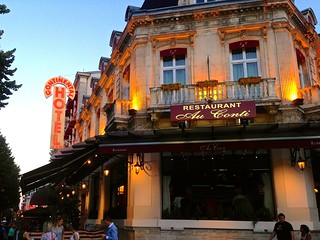 I chose the third, and was happy to be placed into a group of five others from China, Poland, Turkey, and (x2) Canada. After familiarizing ourselves with the articles we'd been assigned to read and critique, we spent the following three and a half days assessing any holes in the literature, developing research questions and broader theoretical frameworks (i.e., why we would expect certain answers to our questions based on established theories), and developing a research plan to carry out studies to test that central question.
I chose the third, and was happy to be placed into a group of five others from China, Poland, Turkey, and (x2) Canada. After familiarizing ourselves with the articles we'd been assigned to read and critique, we spent the following three and a half days assessing any holes in the literature, developing research questions and broader theoretical frameworks (i.e., why we would expect certain answers to our questions based on established theories), and developing a research plan to carry out studies to test that central question.
It was intense. Imagine squeezing a semester-long crash-course on research into only three and a half days. We worked 14-hour days in close-knit social situations, and because we came from such different research backgrounds, finding solutions that interested and fit every member felt nearly impossible at times. We gave presentations every day, first for 15 minutes and then for 30 and 40 minutes -- and as might be expected, this kept stress levels quite high. However, I had great group members, and over the course of this experience was so, so grateful to be able to meet so many incredible people.
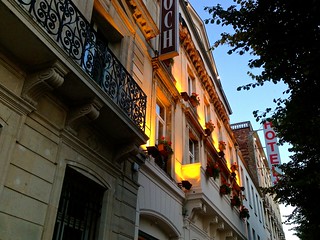 It might have been the single most important decision of this trip, to apply for a summer school about which I knew very little -- because if I'd started to feel an odd affection for Reims when exploring it alone, it was nothing to exploring when with friends.
It might have been the single most important decision of this trip, to apply for a summer school about which I knew very little -- because if I'd started to feel an odd affection for Reims when exploring it alone, it was nothing to exploring when with friends.
We made a point of sharing every meal together -- always within small groups out of our large number, but also switching up the people with whom we ate and spent time. Whether it was having drinks at a nearby pub or pizzas on Place Drouet d'Erlon (our frequent haunt), or even watching the World Cup final (with several German friends in attendance) first in a public plaza and later in a ritzy restaurant off the main square of the Notre-Dame de Reims, our "off" time away from summer school was just as sacred.
On our last full day, we went to a champagne tasting at Charles de Casanove in north Reims, just across from the Porte de Mars (i.e., Roman gate from previous post). We learned about the champagne-making process from vine to glass, which was far more fascinating than I'd expected, and tasted three varieties including one -- my favorite -- that had been aged seven years in their cellars.
On our last day, each of our nine groups (three within each of the three streams) presented their final research proposal in a professional presentation in front of the larger summer school, as well as a few professors who had arrived early for the conference. Each and every one was a success, and engendered interesting discussion for the hours afterward while we had a picnic in a nearby park.
And then began the conference.
Regardless of how glad I was to participate in summer school, it was nothing to the feeling of relief and gratitude once the conference began. IACCP kicked off with a welcome reception in the courtyard of Palais du Tau (I know, super fancy, right?), where almost 900 cultural psychologists stood talking, hugging, greeting old friends and meeting new colleagues. There was free unlimited champagne from Reims, and waiters wound their way through the crowd with fancy hors d'oeuvres filled with things I couldn't pronounce.
And not only did I arrive with two friends from summer school, but as overwhelming as the number "900" seemed, I already knew one out of every 20 people I saw thanks purely to summer school. After greeting and chatting with Virginia and Oliver, it was easy to wind my way through the crowds to hug friends, meet their own friends and advisors, and pass through the evening with company, rather than struggling to stay with a single person or group.
This difference was also quite marked at the congress dinner the following night, which was held in Halles du Boulingrin, a covered market in north Reims. The 900 chairs and many long tables fit perfectly in the space, and even as I walked in alone (and accepted the first glass of champagne that was handed to me at the door -- oh my goodness, this conference), I immediately saw friends standing by the tables piled with meats, cheeses, and breads, or sitting at tables within reach of bottles of local Bordeaux, or greeting professors and big-wigs in cross-cultural psychology.
I'd also like to throw in here that I handed a slice of apple pie to John Berry -- the John Berry, Michael Jackson of acculturation research.
And somewhere, on someone's camera from summer school, exists a photo with Geert Hofstede -- the Geert Hofstede, Elvis of nation-level data -- standing in the background and looking vaguely in the camera's direction while I stand there, mouth open in a look of silent excitement, wishing I had a better reason to introduce myself than mere adoration.
In any case.
The conference was set up as most psychology conferences are, with a series of 1.5-hour symposia held from 8 a.m. to 7 p.m., one or two keynote speakers who are big deals in the field, maybe 60 posters sprinkled throughout the halls with their authors standing close by, one or two 15-minute coffee (and croissant) breaks, and lunch. Each symposium comprised four to six interrelated presentations (e.g., in content, theory, approach), and within any given symposium session there were as few as four and up to eight possible symposia to choose from.
 And in case anyone had even the slightest doubt of my nerdiness, I have no shame in confessing that one of my favorite parts of conferences is sitting down with a highlighter and attacking the program of symposia to decide what to see and when.
And in case anyone had even the slightest doubt of my nerdiness, I have no shame in confessing that one of my favorite parts of conferences is sitting down with a highlighter and attacking the program of symposia to decide what to see and when.
Throughout the conference, summer school attendees did a great job of showing their support by attending each other's presentations. It was a great opportunity, linking the professional side of these individuals we met at summer school, the fun side we met in the evenings, and the academic researcher side that made itself known at the front of a classroom.
As such, it became a common question to ask the day and time of each friend's presentation and to show up at that time, camera and smile ready, to hear more about their research.
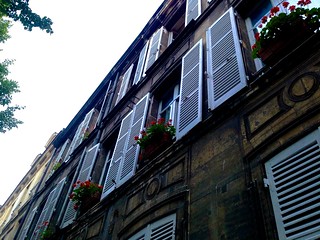 But when I was asked, and when I replied that mine was Thursday at 8 in the morning, I would get blank stares, slightly open mouths, and a slow, "Good luck! You'll be great!"
But when I was asked, and when I replied that mine was Thursday at 8 in the morning, I would get blank stares, slightly open mouths, and a slow, "Good luck! You'll be great!"
To borrow the vocabulary of a summer schooler from London, who in their right minds goes to symposia at 8 in the bloody morning.
I end this statement with a period because it's not a question; I already know the answer.
No one goes to symposia at 8 in the bloody morning.
And so I was delighted to show up for my talk early Thursday morning and see several summer school friends who had braved the late night (i.e., after dancing at the congress dinner until past midnight), the early morning, and the broken tram to reach Campus Croix Rouge. Regardless of the hour, I had a good-sized audience that mixed familiar and non-familiar faces, and had the opportunity to greet and chat with many as they walked in and took their seats.
Sharon, my co-chair, gave the audience a lovely introduction to my background and research, and then it was my turn to take the stage, introduce each presenter and his or her research, and finally to present my own.
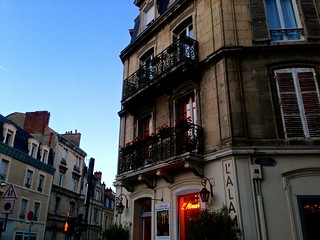 The very first hint that I wanted to pursue a career in academia is my love of teaching. There are few things on earth that don't make me enthusiastic -- anything can be exciting if construed in the right way -- but there are many fewer things on earth that make me "come alive". As much as I love shopping, for example, it doesn't make me "come alive".
The very first hint that I wanted to pursue a career in academia is my love of teaching. There are few things on earth that don't make me enthusiastic -- anything can be exciting if construed in the right way -- but there are many fewer things on earth that make me "come alive". As much as I love shopping, for example, it doesn't make me "come alive".
But when standing in front of a classroom and teaching something near and dear to my heart -- which in the past has ranged from entire sections of introductory psychology to a guest lecture on emission and reflection nebulae -- I come alive. In those precious moments, there are few places I would rather be.
As I started speaking, I realized that this wasn't necessarily a one-way road: I wasn't sharing research with a blank wall (although I'd done plenty of that while pacing in my hostel room), I was engaging in a discussion with individuals who were either interested in what I do or happened to wake up early that morning and couldn't think of anything better to do than to listen to presentations on sources and modalities of cross-cultural social support for an hour and a half while the rest of France kept sleeping.
Either way, I was teaching. No notes, no nerves, no hesitations -- simply having an intellectual discussion with the audience in front of me. And I loved every second of it.
The following two nights were spent in celebration of the successful completion of our presentations, whether they be oral or poster, and of yet another IACCP. Our group of summer schoolers sat in the plaza outside our hostel with local wine, champagne, and beer, talking and laughing until the early hours of the morning. We explored the town, explored the local (cheap) cuisine, compared conference experiences, and discussed travel plans for next year's IACCP, which will be in San Cristóbal.
One of my favorite experiences was the Notre-Dame light show that played at 11 and 11:30 p.m. each night and resembled Disney's World of Color: Elaborate images and colors were projected onto the face of the cathedral while set to music, showing the many stages of its construction over the centuries. By that point in the evening, the weather was perfect -- all memories of the day's 95º heat, 90% humidity, and total lack of A/C at the conference -- and we simply sat and enjoyed the incredible sights and sounds around us.
Okay. Academic spiel over, and two and a half weeks of explorations ahead. Even as I type this while traveling somewhere through Île-de-France, I can't help but truly miss Reims. My aching feet and new ergonomic shoes are proof of our daily six-mile treks throughout the city, but those treks were what truly made the city feel like a temporary home. I know most streets and alleys, recognize most sights and sounds, and have come to love everything that made Reims the little jewel that it was.

